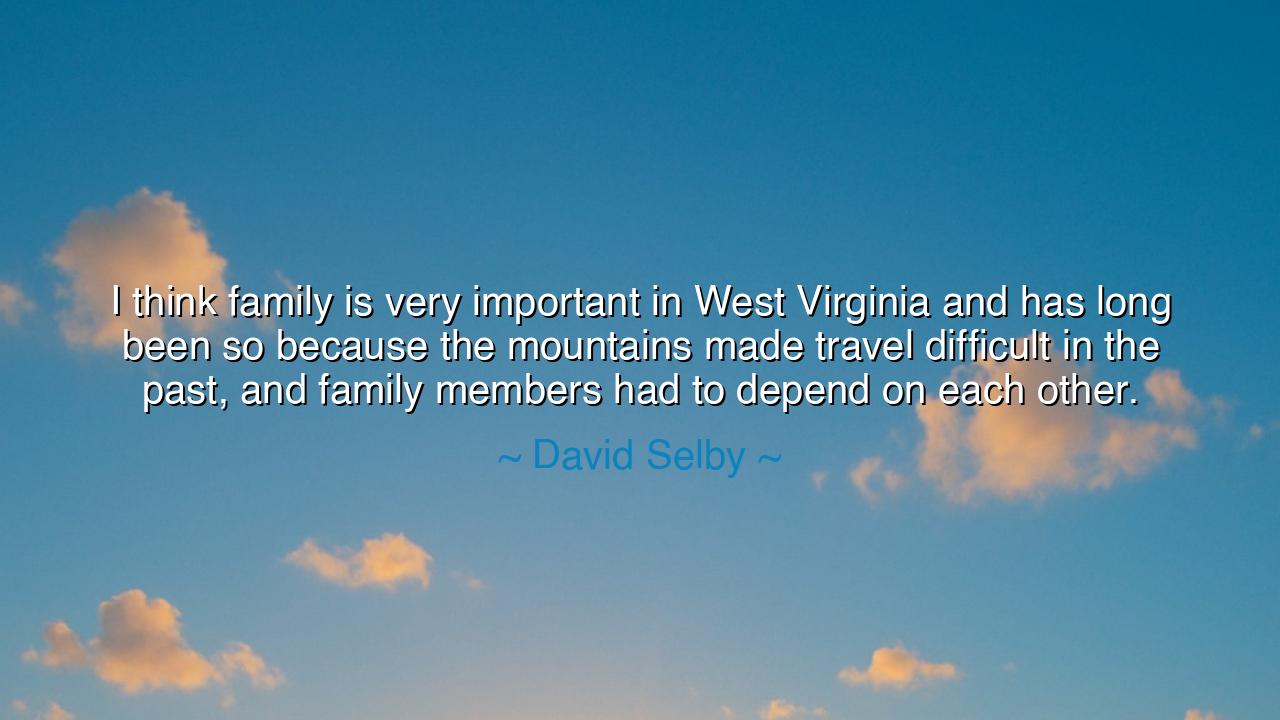
I think family is very important in West Virginia and has long
I think family is very important in West Virginia and has long been so because the mountains made travel difficult in the past, and family members had to depend on each other.






In the words of David Selby: “I think family is very important in West Virginia and has long been so because the mountains made travel difficult in the past, and family members had to depend on each other.” These words shine with the wisdom of place and the endurance of generations. They speak not only of family, but of the bond between land and people, and of how the stern hand of nature can shape the spirit of a community. For where the path is rugged and the road long, it is the circle of kin that becomes the fortress, the hearth, and the wellspring of strength.
To say that the mountains made travel difficult is to reveal the silent teacher that geography can be. In the valleys of Appalachia, steep ridges and winding trails kept families close, cut off from distant towns, markets, and cities. What the earth denied in ease, it granted in resilience. In the absence of broad roads and swift commerce, families turned inward, not in isolation but in solidarity. Brothers worked side by side in the fields, sisters shared the burdens of the home, and generations leaned upon each other like trees in a thick forest, each rooted in the other’s strength.
This truth is not unique to West Virginia. Throughout history, lands that were rugged and remote forged some of the tightest bonds of kinship. In the highlands of Scotland, clans survived through loyalty and unity, standing shoulder to shoulder against harsh winters and rival foes. In the mountains of Japan, villagers depended on one another to plant rice and preserve their traditions, for survival was impossible without shared labor. Thus Selby’s observation is a thread woven into the great tapestry of human history: when the land is hard, the heart learns to be strong through family.
Consider the tale of the American frontier. When settlers moved westward into wilderness, it was rarely the lone man who thrived, but the family that endured. They built cabins with their own hands, drew water from shared wells, and gathered by lamplight to read scripture, sing songs, and tell stories. Danger lurked in the woods, storms threatened the crops, yet survival was won not by isolation but by unity. In West Virginia, hemmed in by the great Appalachian Mountains, this truth was magnified: the very earth commanded men and women to turn toward one another.
And what of dependence? Selby tells us plainly: family members had to depend on each other. In such words lies no weakness, but strength. For dependence is not surrender; it is trust. It is the courage to admit that no life can be lived alone. In ancient Rome, the familia was not merely parents and children, but servants, elders, kin—all bound together, each sustaining the other. In every age, dependence has been the crucible in which love is tested and proven true. The mountains of West Virginia, by forcing people to lean on family, preserved this sacred bond through hardship.
The lesson, then, is this: do not despise the obstacles of life, for they often teach what ease cannot. Just as the mountains of West Virginia taught endurance and loyalty, so too do the trials of our own lives teach us to cherish those who stand beside us. To honor family is to honor the first community, the first teacher, the first refuge. Without it, one is adrift; with it, one can withstand even the storms of fate.
In practice, let each of us look to our own families—whether of blood or of choice—and strengthen the ties that bind us. Share burdens, give without asking, and listen with patience. Tell the old stories, for they keep memory alive. Visit the elders, for they carry wisdom deeper than rivers. And when hardship comes, as it always does, stand firm with those you love, knowing that the strength of unity is greater than the might of any mountain.
Thus Selby’s words echo across time: family is important because the land itself taught it so. From rugged paths were born rugged hearts, and from dependence was born resilience. May we remember this truth in our own lives: that when the road is steep and the journey long, it is family—whether given or chosen—that becomes our true compass, our shield, and our home.






AAdministratorAdministrator
Welcome, honored guests. Please leave a comment, we will respond soon